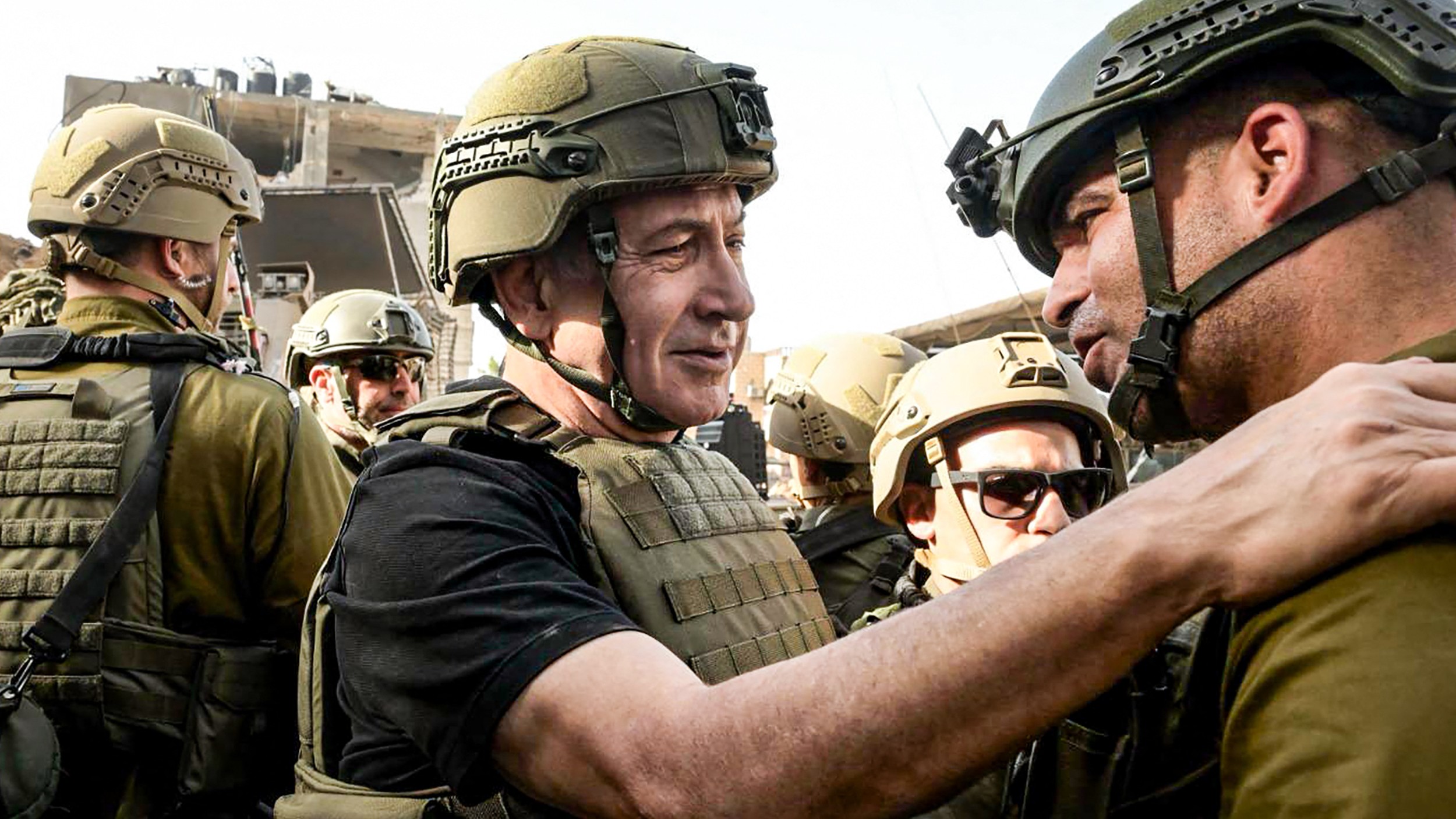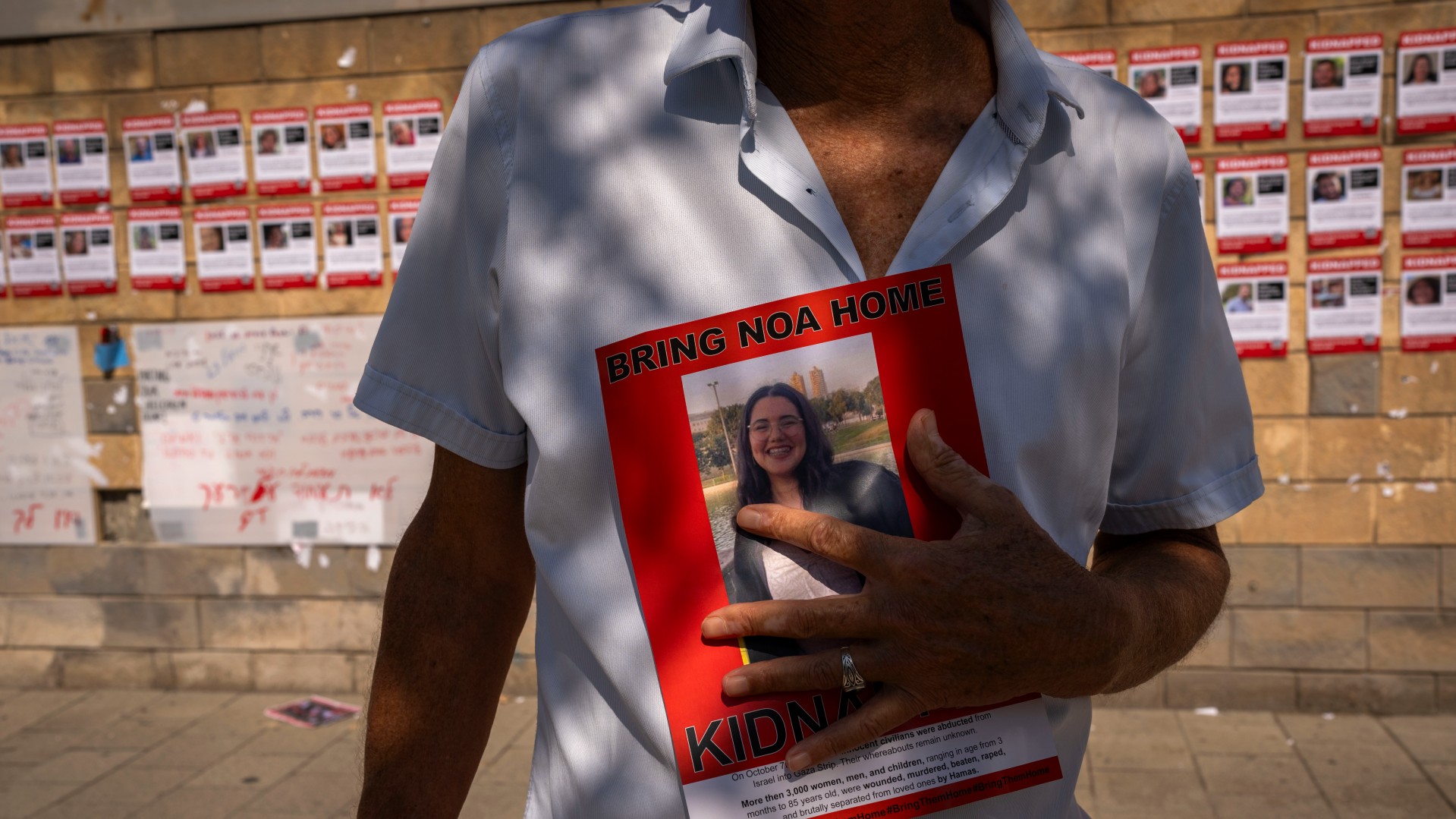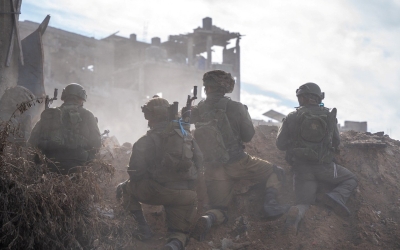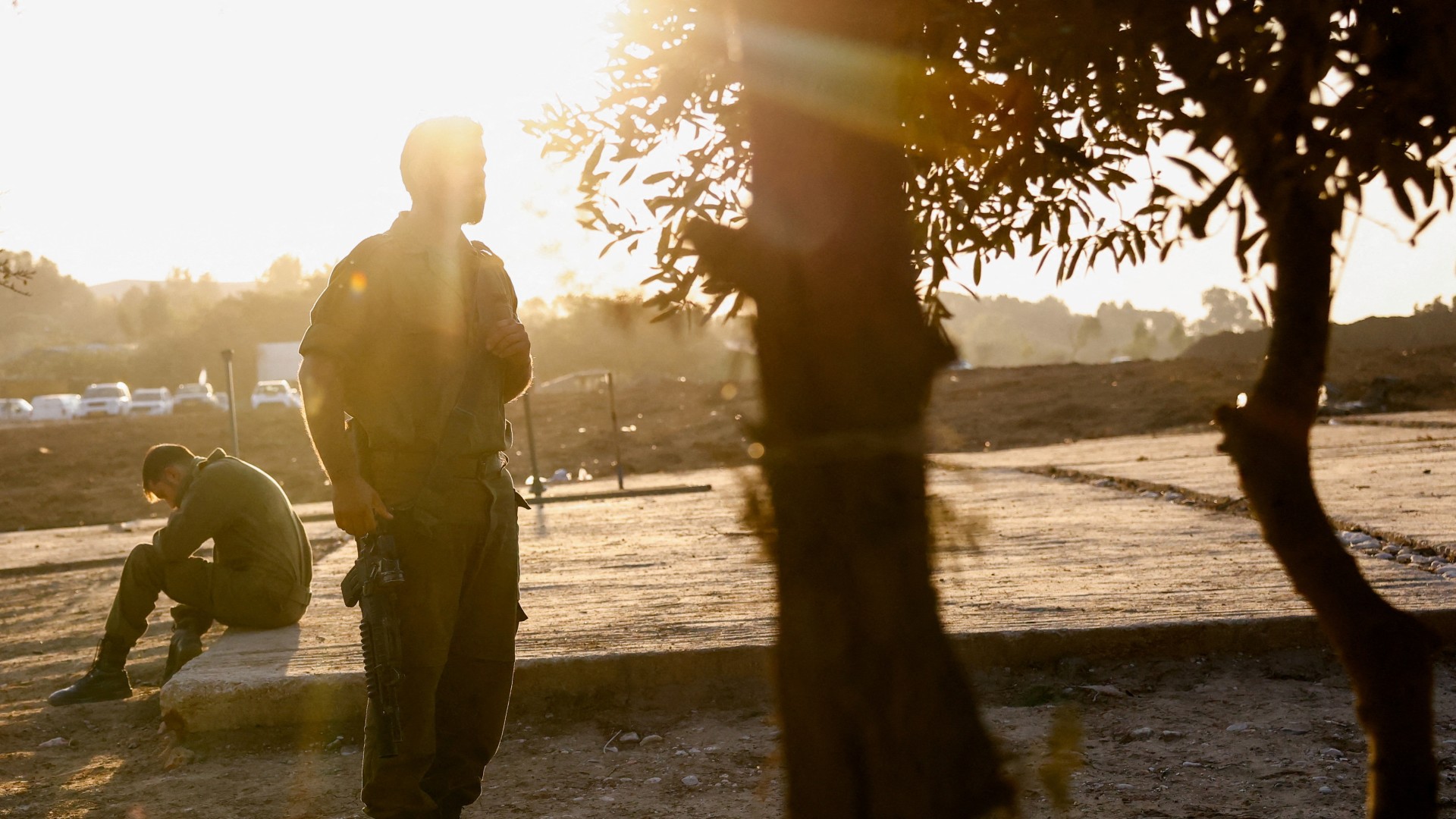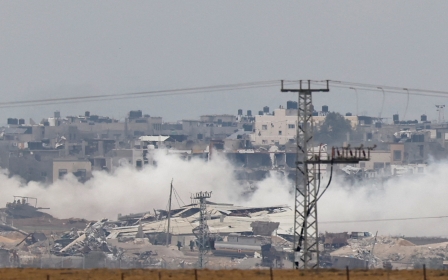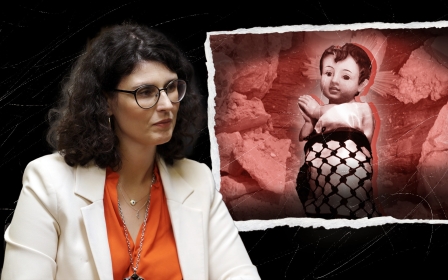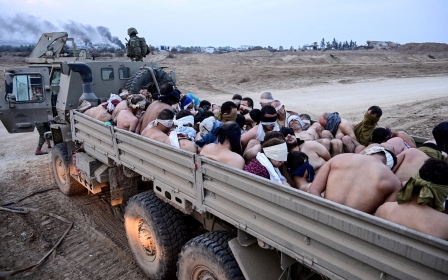Israel has no plan for the day after the war on Gaza

It’s a simple question that no one in Israel wants to answer: what happens the day after the war in Gaza ends?
So fraught is the issue that it cracked open fissures within Benjamin Netanyahu’s government when it was raised in a heated cabinet meeting on Monday, with the prime minister rushing to defend his embattled chief of staff, Lieutenant-General Herzi Halevi.
According to multiple reports in the Israeli media, Halevi did not take kindly to attacks from Itamar Ben Gvir, the national security minister, and Transport Minister Miri Regev, who accused the army of not providing adequate backup to soldiers on the ground.
Regev, a senior member of Netanyahu’s Likud party, noted that the policy of starving Gaza had no effect on Hamas.
Tempers flared further when Halevi raised the prospect of establishing buffer zones within Gaza, drawing exasperation from Justice Minister Yariv Levin, who noted the government’s legal adviser said the scheme could only be temporary.
New MEE newsletter: Jerusalem Dispatch
Sign up to get the latest insights and analysis on Israel-Palestine, alongside Turkey Unpacked and other MEE newsletters
Ben Gvir, the far-right leader of the Jewish Power party, intervened, accusing Halevi of “already ending the war… We should stay in Gaza,” he asserted.
“Are you looking at me?” the chief of staff shot back, before Netanyahu stepped in.
“Look at me, not him,” the prime minister said.
They all might as well look at Netanyahu, because as they all know, the prime minister and seasoned political survivor has personal interest in keeping the war going, even after the death of 20,000 Palestinians and 137 Israeli soldiers.
Leading experts on Israeli politics and former diplomats interviewed by Middle East Eye agree that Netanyahu has no plan for the day after, because the military operation in Gaza is a catastrophe from which his government cannot recover.
'Operation Shalom Bibi'
Essentially, Israel's strategy in Gaza is being driven by the political needs of its prime minister, Dr Assaf David, director of the Israel in the Middle East programme at the Van Leer Jerusalem Institute and professor at the Hebrew University, told MEE.
David jokes that if the 1982 Lebanon war was called Operation Shalom HaGalil (Peace for the Galilee), today’s conflict should be known as Operation Shalom Bibi (Peace for Netanyahu; Bibi being his common nickname).
David believes things would be markedly different if Israel were ruled by a government led by Benny Gantz, the centre-right former army chief and Netanyahu rival who joined the war cabinet following the 7 October Hamas-led attack on Israeli communities near Gaza.
In that case, David could foresee a political process starting after the war ends. Israel would leave the army in the north but “give room” to the Americans and Palestinians, with whom there would be an exchange of prisoners, he predicted.
“But this is not the case. Bibi does and will do everything to survive, and in his thinking, anything that is interpreted as a concession to Hamas will complicate his life even more than it already is,” David told MEE.
“He is in trouble with the left, the centre, and then he will be in trouble with the right. He won’t let that happen.”
Follow Middle East Eye's live coverage for the latest on the Israel-Palestine war
In David’s analysis, Netanyahu will only leave Gaza when he is forced to by Washington. The Palestinian Authority (PA) will not be allowed to return to Gaza, and all the Israeli captives there will die.
Gilad Shalit, an Israeli soldier captured by Hamas in 2006 and later traded for 1,000 Palestinian prisoners, could not be rescued in a military operation, he noted. “So will the remaining 135 [captives] be able to be released in a military operation? It's stupid and they know it, but they don't care any more. For them, their story is over. This is right-wing thinking.”
'Sinwar will not go back to prison. If they reach him he would rather die'
– Dr Assaf David, professor at the Hebrew University
Even the war cabinet’s thinking about hostages is riddled with contradictions, David said.
“Everyone who claims that Hamas is an irrational fundamentalist religious organisation also claim that they will only release the prisoners when pushed hard enough against the wall. This is nonsense. What will happen instead if we push Hamas against the wall is they will kill the prisoners. They have nothing to lose,” he added.
Meanwhile, Israel’s aim of capturing Hamas leader Yahya Sinwar to exhibit as proof of victory is similarly unrealistic.
“Sinwar will not go back to prison. If they reach him he would rather die,” David said.
Blame game
Eran Etzion, ex-diplomat and former deputy head of Israel’s National Security Council, agrees.
Netanyahu is thinking about the day after, Etzion said, but only about how that affects his chances of political survival.
“It is very clear he has already realised that the Americans are going to stop him before he has achieved the goals of the war. He is already preparing for the ‘blame game’ in which his targets will be Biden, the military chiefs, the media, and, as we say in Hebrew, the whole world and his wife, who prevented him from achieving victory,” Etzion told MEE.
“So for him, the day after is the continuation of the war by any means, the goal being survival in power.”
Etzion notes that even after two months of the military campaign there is no official forum or group of officials planning governance in Gaza post-war. And there are no official discussions between the Israeli defence establishment and US officials in Washington.
Some have floated the idea of Arab countries with relations with Israel, such as the UAE and Egypt, sending security and administrative forces to Gaza. But no Arab countries have given any sign of being willing to cooperate with this process.
“As far as Netanyahu is concerned, this all fits into his plan, because he does not want to create a day-after sit-in involving third parties or, God forbid, the Palestinian Authority,” Etzion said.
Winding down the war
Experts and informed observers spoken to by Middle East Eye all agree that the war will wind down - although not end - in three stages.
The current stage of intense bombing aimed at making large parts of Gaza unliveable will end either this month or in early January, under US pressure.
Israel’s relentless bombardment will come to a close, ushering in a period of lower-intensity combat. This will be characterised by strikes on specific targets and a guerrilla war carried out by Hamas. But Israeli forces will remain in the areas they think they control.
For this to happen, the Israeli army will have to secure the southern border around Rafah, to prevent Hamas being resupplied with weapons using tunnels from Egypt.
The third period will be the establishment of an Israeli civilian administration in the north of Gaza and an eventual withdrawal, when it is replaced by some sort of Palestinian administration.
Each stage, however, poses more questions than it answers.
'For Netanyahu, the day after is the continuation of the war by any means, the goal being survival in power'
- Eran Etzion, former deputy head of Israel’s National Security Council
Middle East Eye’s sources all agree that a political outcome to the crisis is next to impossible under the current government.
This would almost certainly be the “all for all” deal being pushed by Hamas, the Qatari mediators and some families of Israeli captives, which would see the approximately 130 Israelis being held in Gaza released in return for all 7,000 Palestinian prisoners.
It would also include the release of the Fatah leader Marwan Barghouti, who would then be free to run for the position of president of the Palestinian Authority.
As the operation winds down, Netanyahu will come under pressure from an array of forces that are currently gathering strength.
The campaign by the families of the captives will grow in intensity. Their last meeting with Netanyahu ended in furore. The prime minister was accused of putting his political career before the lives of the captives, according to voice recordings of the meeting on 5 December.
In an excerpt broadcast on Israel's Channel 12, the mother of a captive shouted at Defence Minister Yoav Gallant, demanding that he promise to bring everyone back alive.
“I’m not prepared to sacrifice my son for your career or for those of any of the notables here. Really not. My son did not volunteer to die for the homeland. He was a civilian abducted from his home and his bed,” she said.
Ameer Makhoul, a Palestinian commentator, said Israel cannot bypass or ignore the issue of the captives, simply because Zionist ideology dictates that Israel is the safest place for Jews to live.
Netanyahu heads the most right-wing government in Israeli history, stacked full of ultranationalists and Jewish supremacists whose priority is prosecuting the war as ferociously as possible. But they will nonetheless be vulnerable to popular pressure.
“The hostages are a Palestinian political tool, but it’s also a win-win game. There will be a deal that both sides will benefit from,” Makhoul told MEE.
Palestinian rule
Makhoul said Israeli security authorities were already talking to leading Palestinian figures in their prisons about forming a future leadership. But this, too, is riven with contradictions.
“They don’t want to see Hamas ruling the day after. But for the past two decades the Israeli strategy has been based on the separation of the Palestinian leadership: Gaza alone, separate from Ramallah. But anyway, there is going to be a deal. Maybe it will take time.”
The second big issue is the governance of Gaza, large parts of which have been destroyed. Even if the Israeli army allows the million Palestinians forced from the north back to their homes, there are no homes to return to.
Makhoul said: “It’s clear that Gaza is not Gaza as it was: urban life and human lives lost, the comprehensive destruction of the health system, schools, markets.”
Unrwa, the United Nations agency for Palestinian refugees, which underpinned much of Gaza’s society, “was targeted as if Israel wanted to erase it from the scene”, he added. “People will be going back to an area where they have nothing to live in.”
For this reason alone, Palestinians must think seriously about the possibility of a continuing occupation by Israel.
Makhoul noted that Israel’s parliament, the Knesset, has already cancelled the Disengagement Plan Implementation Law passed in February 2005, when then-Prime Minister Ariel Sharon withdrew Israeli settlements in Gaza.
If Israel continues to occupy Gaza on the ground, Makhoul said, “I can see the return of resettlement in Gaza’s north.” The far-right religious Zionist movement is already mobilising public opinion for such an outcome.
Muhammed Alqaiq, a former prisoner and Palestinian activist, dismissed the idea that the PA - which has not been present in Gaza since a Hamas victory in legislative elections preceded clashes in 2007 between the movement and the PA’s leading party, Fatah - could ever take over the coastal enclave.
The PA, which administers the occupied West Bank and has close security coordination with Israel, is considered by many Palestinians as venal and an Israeli tool of repression.
“The talk about the [PA] civil administration is a thing of the past, because it failed in its role even in the West Bank. It cannot be used in Gaza, because after 74 days of fierce war, the resistance [Hamas] is still bombing Tel Aviv, and this is clear evidence of its steadfastness and the strength of its structure.”
If Hamas were to be ousted from Gaza, its role in the region would only strengthen, Alqaiq predicted. “The idea and existence won’t end,” he told MEE.
By inflicting one of Israel’s greatest defeats on 7 October, killing around 1,200 Israelis, and fighting fiercely in Gaza, Hamas has expanded its appeal and ideology regionally and internationally, Alqaiq said.
Lessons from Lebanon
There would also be military issues arising from an indefinite period of “low-intensity” operations.
Even if the Israeli military is right to claim that Hamas’s chain of command at battalion level has crumbled, smaller units retain the ability to attack Israeli troops effectively.
A battalion commander from the Israeli army’s Kfir Brigade told local TV that although his unit had completed a task assigned to it in Shujaiya, east of Gaza City, “the enemy was everywhere, unseen because they were in hiding”.
Over time, the operation in Gaza could quickly resemble the 1982 Lebanon war, in which Israeli forces in cooperation with their Maronite Lebanese allies occupied southern Lebanon and forced the Palestinian Liberation Organization to leave West Beirut.
However, their position in Beirut became untenable and their withdrawal to south Lebanon in 1985 led to a guerrilla war lasting 15 years, until the final exit in 2000.
Already a discussion is under way in Israel about what the war aim “mitut Hamas” (collapse Hamas) actually means. After over two months of relentless bombing, the Qassam Brigades, Hamas’s military wing, can still launch missiles at Jerusalem and inflict heavy casualties during an attack on Israeli bases in Gaza.
Either way, the devastation of Gaza leaves any future Israeli government with a huge problem.
The extreme national-religious right will want to replicate the Gaza paradigm in the West Bank, where operations by the Israeli army have morphed from raids to a strategy of forced displacement.
“If ethnic cleansing succeeds in Gaza they will try [it] in the West Bank,” Makhoul said.
These events will also cause a re-evaluation by Palestinians of their leadership.
“As Palestinians, we should ask the hard questions: what price do we have to pay as a people? Was the operation of 7 October positive, or very dangerous? Who has the right to declare on matters that affect the whole Palestinian people?” Makhoul asked.
“I think it’s not Fatah, not Hamas, not even the PLO. These are questions that will be raised later on.”
Middle East Eye delivers independent and unrivalled coverage and analysis of the Middle East, North Africa and beyond. To learn more about republishing this content and the associated fees, please fill out this form. More about MEE can be found here.


